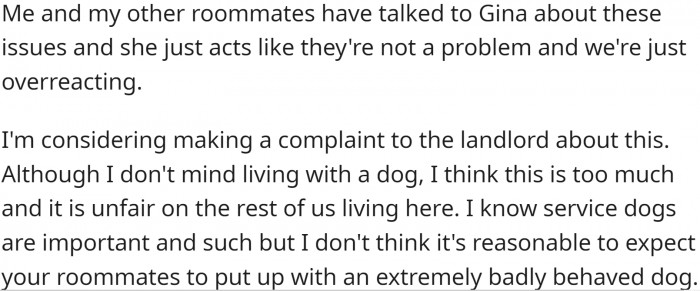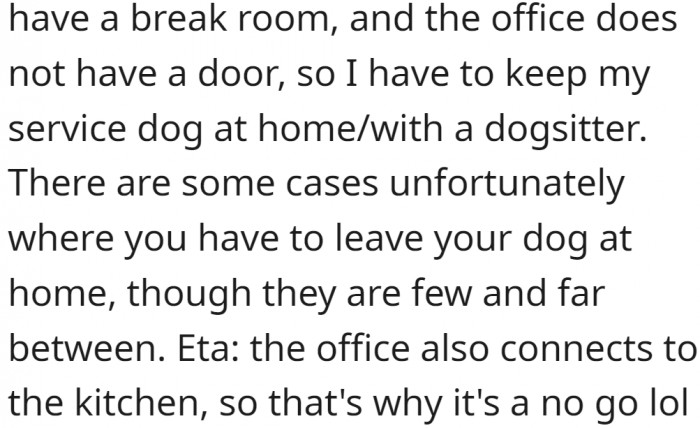Redditor Asks If She Should Report Her Roommate And Her "Service" Dog To Landlord Because They Are Making Her Life A Living Hell
Service dogs are trained to assist people with disabilities in various tasks and activities of daily living. These dogs are trained to perform specific tasks that their disabled handlers are unable to do due to their disabilities, such as guiding people who are blind, alerting people who are deaf, pulling a wheelchair, or fetching items for people with mobility impairments.
However, many people attempt to pass their pets off as service dogs to gain access to no-pet rentals. By law, service dogs are allowed in such buildings.
We have one of those stories today. One Redditor asked: "WIBTA if I complained to the landlord about my roommate's service dog?"
She has three roommates, and one of them has a dog. She claims it is a service dog.
This roommate moved in about two months ago, and during that time, the dog has proven to be very poorly trained and often misbehaves. OP lives in a building with a strict no-pet policy.
OP continued to list the problems the dog has caused during these two months, and it is a long list.
This is clearly a roommate from hell. OP is considering making a complaint to the landlord.
She has support from one of the roommates, while the other doesn't want to rock the boat. OP knows that she has the legal right to complain, but does she have a moral right?
OP asks:

She has three roommates, and one of them has a dog. She claims it is a service dog.

This roommate moved in about two months ago, and in that time, the dog has proven to be very poorly trained and often misbehaves.

Understanding Service Animals and Their Impact
Service animals are trained to assist individuals with disabilities, and their behavior is critical to their effectiveness. In this case, the poorly behaved 'service' dog raises questions about the legitimacy of its designation and the owner's responsibility.
Research in animal behavior indicates that properly trained service animals can significantly enhance the quality of life for their handlers. However, when animals are not adequately trained, it can lead to distress for both the animal and the people around them.
Understanding the Role of Service Animals
Service animals play a critical role in supporting individuals with disabilities, providing not only physical assistance but also emotional support. Research in the Journal of Animal Science demonstrates that well-trained service animals can significantly improve the quality of life for their owners. However, the responsibilities that come with having a service animal can create challenges in shared living situations.
Understanding these dynamics is crucial for navigating conflicts around service animals and their owners.
OP lives in a building with a strict no-pet policy

OP lists problems the dog has caused during these two months

And it is a long list

Moreover, the emotional toll of dealing with a poorly behaved service dog can create significant stress for roommates and other individuals in the environment. Studies show that animals exhibiting problematic behaviors can trigger anxiety and frustration in their owners and those around them.
This emotional distress highlights the need for responsible pet ownership and proper training for service animals.
Untrained or poorly behaved animals can lead to significant stress for both their owners and those around them. A clinical psychologist notes that the behavior of service animals can reflect the emotional state of their owners, leading to challenges in managing their interactions with others. Research indicates that emotional distress can exacerbate behavioral issues, creating a cycle of stress.
Addressing these behavioral concerns is essential for maintaining a harmonious living environment.
This is clearly a roommate from hell.

OP is considering making a complaint to the landlord

OP has support from one of the roommates, while the other doesn't want to rock the boat

The Importance of Training and Socialization
Proper training and socialization are essential for ensuring that service animals can perform their duties effectively. Research indicates that socialization and training directly impact an animal's behavior and the safety of those around them. According to Dr. Mark Hyman, a functional medicine expert, "A well-trained service animal not only enhances the quality of life for their handlers but also creates a safer environment for everyone involved." Furthermore, insights from Dr. Pepper Schwartz, a sociologist, emphasize that well-trained service animals significantly contribute to positive social interactions and emotional well-being.
The Importance of Training and Socialization
Proper training and socialization are essential for service animals to function effectively in public and home environments. A study from the Journal of Applied Animal Behavior Science indicates that well-trained animals are less likely to exhibit disruptive behaviors, leading to a more positive experience for everyone involved. Owners must prioritize training to ensure their animals can navigate various environments appropriately.
Encouraging owners to engage in consistent training can improve their animals' behavior and reduce stress for all household members.
OP knows that she has the legal right to complain, but does she have a moral right?

OP has offered the following explanation for why they think they might be the asshole:

That’s not a service dog

Additionally, the responsibilities of pet ownership extend beyond just providing basic needs. Owners must ensure that their animals are adequately trained and well-behaved, particularly in shared living situations.
Studies show that roommates can experience significant stress when they are required to manage disruptive behaviors from pets, leading to conflicts within shared spaces.
Communication between the service animal owner and their roommates is vital for establishing mutual understanding. Research in the American Journal of Community Psychology highlights that open dialogue can help clarify expectations and reduce misunderstandings. By discussing the needs and challenges of having a service animal, roommates can foster a more accommodating living environment.
Creating a platform for open communication can alleviate tensions and promote collaboration.
It is an emotional support animal (ESA), and there is a huge difference.

"Service dogs don't stay home when the owner goes to work"

It is just a pet

Navigating Conflicts with Roommates
When dealing with disruptive pets, clear communication with roommates is vital. Relationship expert Dr. Esther Perel states, "Open dialogue about boundaries and expectations can significantly reduce conflict and enhance mutual understanding." Research in conflict resolution emphasizes that open discussions about pet behavior can help mitigate tensions and foster understanding. According to Dr. Terri Orbuch, a relationship researcher, "Addressing issues directly and collaboratively can lead to more harmonious living arrangements."
Addressing Behavioral Concerns Constructively
When behavioral concerns arise, addressing them constructively is essential. A family therapist might suggest that roommates express their concerns in a non-confrontational manner, focusing on the behavior rather than the individual. Research indicates that using 'I' statements can help prevent defensiveness and promote understanding.
By implementing constructive communication strategies, roommates can work together to find solutions that respect both the service animal's needs and the comfort of all household members.
This Redditor shared their experience:

This one too:

This Redditor has a service dog, and they say:

Furthermore, it may be helpful for the roommate to establish boundaries regarding acceptable pet behavior. Setting clear expectations can alleviate stress and help everyone involved feel more comfortable in their shared living space.
Studies show that establishing boundaries in shared living situations can significantly reduce conflict and enhance overall satisfaction.
Recognizing the emotional impact of service animals on their owners is crucial for fostering empathy. A clinical psychologist notes that service animals often provide emotional support beyond their physical capabilities. Understanding the bond between the owner and their service animal can help roommates appreciate the significance of their presence and needs.
Fostering empathy can lead to a more supportive living environment for everyone.
In some cases, they have to leave their dog at home, but that's not that often.

Good advice - "Document everything in detail for a week, send it all to the landlord, and demand quick action."

Service dogs have all kinds of tasks

Seeking Professional Intervention
In some cases, professional intervention may be necessary to address behavioral issues with pets. Engaging a certified animal trainer or behaviorist can provide valuable insights and strategies for improving the dog's behavior.
Research indicates that professional training can enhance the relationship between pet owners and their animals while ensuring a safer environment for everyone.
The Role of Compromise in Shared Living Situations
Compromise is essential in shared living situations, especially when it involves service animals. A study in the Journal of Applied Psychology highlights that families and roommates who practice compromise report higher satisfaction and better relationships. By working together to establish ground rules that accommodate the service animal's needs, roommates can cultivate a harmonious living space.
Encouraging collaboration can help create an environment where all individuals feel respected and valued.
It is not advisable to present a pet as a service dog in order to avoid no-pet rental rules or other similar restrictions, as this can be harmful to people who actually need service dogs. Service dogs are protected under federal law and are allowed to accompany their handlers in places where pets are typically not allowed, such as on planes, in restaurants, and in rental properties.
When people falsely present their pets as service dogs, it can create confusion and undermine the credibility of legitimate service dogs and their handlers.
This can make it more difficult for people who genuinely rely on service dogs to access the places and services they need, and it can also lead to negative attitudes and stereotypes about service dogs and their handlers.
Psychological Analysis
This situation illustrates the complexities of living with a service animal in shared spaces. It's essential for all parties to communicate openly about their needs and expectations. By fostering understanding and cooperation, roommates can navigate these challenges more effectively.
Analysis generated by AI
Analysis & Alternative Approaches
In conclusion, navigating the challenges of shared living situations with service animals requires effective communication, understanding, and compromise. By addressing behavioral concerns constructively and fostering empathy, roommates can create a supportive environment that respects the needs of all individuals involved. Implementing training and socialization strategies can further enhance the quality of life for both the service animal and its owner.
In conclusion, navigating the complexities of living with a poorly behaved service dog requires understanding and cooperation. By prioritizing training and open communication, individuals can work toward creating a more harmonious living environment.
Ultimately, recognizing the importance of responsible pet ownership is key to ensuring the well-being of both animals and their owners.
Analysis & Alternative Approaches
In summary, addressing issues related to service animals requires a commitment to responsible ownership and proper training. Research shows that effective communication and collaboration can significantly enhance living situations for everyone involved.
By prioritizing the needs of both pets and roommates, individuals can foster a more positive and supportive environment.



